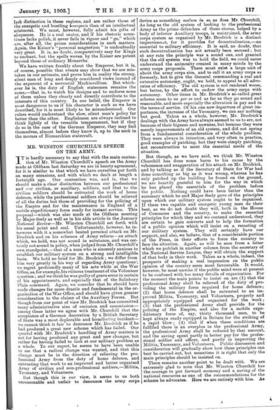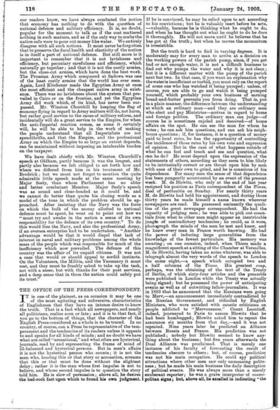MR. WINSTON CHURCHILL'S SPEECH ON THE ARMY.
IT is hardly necessary to say that with the main conten- tion of Mr. Winston Churchill's speech on the Army made at Oldham last Saturday we are in hearty agreement, for it is similar to that which we have ourselves put forth on many occasions, and with which we dealt at length a fortnight ago. Our contention was, and is, that we should make a clear distinction between our professional and our civilian, or auxiliary, soldiers, and that to the civilian soldiers should be entrusted the work of home defence, while the professional soldiers should be relieved of all the duties but those of providing for the policing of the Empire and for the maintenance in England of a mobile expeditionary force ready for instant service. This proposal—which was also made at the Oldham meeting by Major Seely as well as in his able article in the January National Review—Mr. Winston Churchill set forth with his usual point and zeal. Unfortunately, however, he in- terwove with it a somewhat heated personal attack on Mr. .Brodrick and on his schemes of Army reform—an attack which, we hold, was not sound in substance, and was cer- tainly not sound in policy, when judged from Mr. Churchill's own standpoint,—that of a man who is sincerely anxious to establish our military system on a strong and intelligible basis. We hold no brief for Mr. Brodrick ; we differ from him very greatly in his way of regarding Army questions); we regret profoundly many of his acts while at the War Office, as, for example, his ruinous treatment of the Volunteer question; and We think he was guilty of grave error in certain of his appointments, and especially that of the Salisbury 'Plain command. Again, we consider that he should have made changes far more drastic and fundamental in the or- ganisation of the War Office, and should have given greater consideration to the claims of the Auxiliary Forces. But though from our point of view Mr. Brodrick has committed many administrative sins of omission and commission— among these latter we agree with Mr. Churchill that the acceptance of a German decoration by a British Secretary of State was a most deplorable and humiliating incident— we cannot think it fair to denounce Mr. Brodrick as if he had produced a great new scheme which has failed. Our quarrel with Mr. Brodrick's handling of Army matters is not for having produced any great and new changes, but rather for having failed to look at our military problem as a whole. To our regret, he seems to have been unable to see that a radical change was wanted, and that this change must be in the direction of relieving the pro- fessional Army from the duty of home defence, and entrusting that work to an improved and better organised Army of civilian and non-professional soldiers,—Militia, Yeomanry, and Volunteers.
But though this is our view, it seems to us both unreasonable and unfair to denounce the army corps device as something maim in se, as does Mr. Churchill. As long as the old system of looking to the professional Army as the prime defenders of these shores, helped by a body of inferior Auxiliary troops, is maintained, the army corps system as organised by Mr. Brodrick is a distinct improvement, for it provides for decentralisation,—an essential to military efficiency. It is said, no doubt, that such decentralisation has not actually been secured ; but at any rate the principle was a sound one, and granted that the old system was to hold the field, we could never understand the animosity created in many minds by the army corps proposals. There must exist a large unit of about the army corps size, and to call it an army corps as formerly, but to give the General commanding a real and extensive autonomy, ought, we hold, to appeal to all advo- cates of efficiency. The old system is not rendered worse, but better, by the effort to endow the army corps with autonomy. Other items in Mr. Brodrick's so-called great scheme seem to us per as and as fax as they go sound and reasonable, and more especially the alteration in pay and in the terms of service. Of his one new departure of great im- portance, the increase of the Yeomanry, we can say nothing but good. Taken as a whole, however, Mr. Brodrick's dealings with the Army have always seemed to us to err, not because of their bigness and newness, but because they were merely improvements of an old system, and did not spring from a fundamental consideration of the whole problem. They were always in intention, and very often in practice, good examples of patching, but they were simply patching, not reconstruction to meet the essential needs of the situation.
But though, as we have said, we think Mr. Winston Churchill has done some harm to his cause by the vehemence and exaggeration of his attack on Mr. Brodrick, and by talking as if the Secretary of State for War had done something as big as it was wrong, whereas he has only patched up the building he found on the ground, we are heartily grateful to him for the way in which he has placed the essentials of the problem before the public. Nothing could have been better than the summary which he and Major Seely gave of the principles upon which our military system ought to be organised. If these two capable and energetic young men do their best, as we do not doubt they will, both in the House of Commons and the country, to make the essential principles for which they and we contend understood, they are certain to gain converts and to help the formation of a public opinion which will insist on a recasting of our military system. They will certainly have our support, and also, we believe, that of a considerable portion of the Press, in their efforts to force the country to face the situation. Again, as will be seen from a letter which we publish in another column from the secretary of the National Service League, they will obtain the support of that body in their work. Taken as a whole, indeed, the prospects of making a real impression on the public opinion of the country seem most favourable. It would, however, be most unwise if the public mind were at present to be confused with too many details of organisation. For the moment the main points to insist on are (1) that the professional Army shall be relieved of the duty of pro- viding the military force required for home defence; (2) that home defence shall be entrusted to an im- proved Militia, Yeomanry, and Volunteers, properly and appropriately equipped and organised for the work ; (3) that the professional Army shall provide for the policing of the Empire, and also for a mobile expe- ditionary force of, say, thirty thousand men, to be kept always ready equipped in Britain for the striking of a rapid blow ; (4) that if when these conditions are fulfilled there is an overplus in the professional Army, the professional Army shall be reduced by that amount, and the saving spent partly in better pay for the profes- sional soldier and officer, and partly in improving the Militia, Yeomanry, and Volunteers. Public discussion and consideration will gradually show how these principles can best be carried out, but meantime it is right that only the main principles should be insisted on.
There remains another point to be dealt with. We are extremely glad to note that Mr. Winston Churchill has the courage to put forward economy and a saving of the national resources as one of the recommendations, for the scheme he advocates. Here we are entirely with him. As our readers know, we have always combated the notion that economy has nothing to do with the question of national defence and military efficiency. It is, no doubt, popular for the moment to talk as if the cost mattered nothing in such matters, and as if the only way to make the nation safe were to pour out money like water. We entirely disagree with all such notions. It must never be forgotten that to preserve the fiscal health and elasticity of the nation is in itself a part of national defence. But still more is it important to remember that it is not lavishness and efficiency, but pecuniary carefulness and efficiency, which naturally go together ; and that it is not the costly armies, but the close-cut armies, which have done the best work. The Prussian Army which conquered at Sadowa was one of the least costly armies that the world has ever seen. Again, Lord Kitchener made the Egyptian Army at once the most efficient and the cheapest native army in exist- ence. There was no lavishness about the system that pre- vailed in Cairo or on the frontier, and yet the Egyptian Army did work which, of its kind, has never been sur- passed. Mr. Winston Churchill by keeping the flag of economy flying in regard to Army matters will do, not harm, but rather good service to the cause of military reform, and incidentally will do a great service to the Empire, for when the anti-Imperial reaction comes, as come it certainly will, he will be able to help in the work of making the people understand that all Imperialists are not spendthrifts, and that the Empire, and the professional Army on which the Empire to so large an extent depends, can be maintained without imposing an intolerable burden on the taxpayer.
We have dealt chiefly with Mr. Winston Churchill's speech at Oldham, partly because it was the longest, and partly also because we felt obliged to set forth how and where we differed from him in his treatment of Mr. Brodrick ; but we must not forget to mention the quite admirable little speech made at the same meeting by Major Seely, than whom Parliament has no abler and better combatant Member. Major Seely's speech was as sound and clear-headed as it could be, and we cannot do better than quote his closing words as a model of the tone in which the problem should be ap- proached. After insisting that the Navy was the force on which the bulk of the money allotted to national defence must be spent, he went on to point out how we " must try and awake in the nation a sense of its own responsibility for the defence of its own country." To do this would free the Navy, and also the professional Army, if an oversee, enterprise had to be undertaken. " Another advantage would be that it would dispel that lack of interest in naval and military problems among the whole mass of the people which was responsible for much of the inefficiency which now prevailed. The defence of this country was the affair of its unpaid citizens. It was not a case that would or should appeal to sordid instincts. On the Volunteers, the Militia, and the Yeomanry it must rest, and they must be frankly asked to take up the task, not with a sneer, but with thanks for their past services, and a deep sense that in them the nation could safely put its trust."







































 Previous page
Previous page